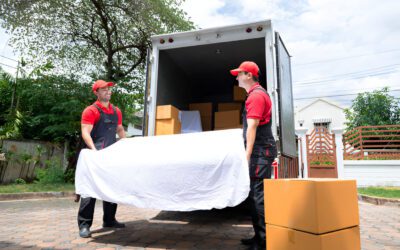Moving is one of the most stressful life events, second only to divorce and job loss. Comparing moving prices and packing books can be easily complicated to the point where the insurance and state-related policies are involved.
This is where professional moving services prove to be different. Not every mover is legal, or even equally protective, however. With the knowledge of what kind of services can be offered, a clear comprehension of licensing and consumer laws in Michigan, and a clear estimation of prices, it is possible to save time, money, and stress. This is a guide that is going to take you through the process of everything that you need to know about relocating services in Michigan, it provides practical suggestions, local knowledge, as well as professional suggestions to help in the relocation process with better organization.
Understanding Local and Interstate Moving Services
How the Moving Industry Works
The American moving business brings about an estimated 20 billion dollars in a year, and thousands of licensed movers and carriers get employment. These businesses deal with small residential moves to the entire commercial relocation.
Moves are of two categories. Intrastate relocations occur within the state, such as a move of Grand Rapids to Detroit. Interstate movements involve moving between states e.g., moving between Michigan and Illinois. They both have legal demands.
In the case of interstate moving companies, the registration at the Federal Motor Carrier Safety Administration (FMCSA) is compulsory. They should possess a U.S DOT number, and they should meet federal insurance and safety standards.
In Michigan, all intrastate movers must be licensed by the Commercial Vehicle Enforcement Division (CVED) under the Motor Carrier Act (Public Act 254 of 1933). This law ensures consumer protection and fair pricing.

Moving Services: Understanding Your Options
The American moving industry offers more options today than ever before. Understanding these categories helps you choose services that match your needs and budget.
1 Local Moves
The moves tend to occur within 100 miles or the same metro. Local movers tend to charge hourly, with an average of 100 to 200 plus per hour based on the crew and the size of the truck. They are perfect when it comes to apartment moving, one-family houses, or when there is a lot of time to get the work done.
2 Long-Distance Moves
Interstate relocations put your relocation under federal regulations by the Federal Motor Carrier Safety Administration (FMCSA) and are referred to as interstate. The long-distance relocation entails a cost that is determined by distance and weight of shipment, where it is estimated that moving house over a distance of $4,500 for a 1,200-mile, three-bedroom move
These moves require more planning, formal contracts, and licensed carriers with a USDOT number.
3 Full-Service Movers
Full-service movers do it all, including packing, loading, transportation, and unloading. It is the most convenient and the most costly. Good in case of families, seniors, or people who might be moving to work and do not want to be disturbed a lot. The average cost may be more than 6000 dollars based on the distance and services selected.
4 Specialty Services
Some of the possessions require special treatment. Artworks, pianos, antiques or vehicles will need special crates, climate-controlled trucks or additional coverage. Specialty movers will be trained in handling delicate or oversized items that may not be included with general movers.
Your Complete Stepwise Guide to Moving
Follow this step-by-step guide to plan, organize, and complete your move in Michigan smoothly. Learn packing tips, hiring licensed movers, understanding costs, and settling into your new home stress-free.
Step One: Planning Your Move Early
Building a Moving Timeline
The greatest solution is to plan at least 2 months before you move. The preparation also gives you time to compare movers, request quotes, and paperwork before time elapses. A realistic schedule will assist in splitting the workload, researching eight weeks earlier, beginning to pack and sort the non-essentials six weeks earlier, finalizing agreements two weeks before, and leaving the last few days to the necessity items only.
Finalizing Legal Paperwork
In Michigan, movers must prepare a written estimate and a bill of lading and present it to the client before commencing the move. This paper will contain the license number of your mover, the total cost, and the dates. Dubiously verify these details and make copies of them, which must be safely kept, as they would be a legal confirmation of the agreement.

Step Two: Comparing Moving Estimates
Understanding Estimate Types
Before entering into any contract, it is important to know how they operate. An estimate that is not binding indicates that the price could vary depending on the weight of your shipment. A binding estimate will make sure that you do not pay a price that is more than what is quoted, and a not-to-exceed estimate will make sure that you will not pay more than what was quoted and might pay less in case your shipment is less than quoted.
Michigan Pricing Protections
The Michigan law does not allow movers to charge excessively to customers. The maximum billable amount that movers can charge on delivery is 110 percent of the written estimate. All other expenses should be negotiated in advance. These laws guard clients against the abrupt rise of prices and illegal firms.
Step Three: Understanding Moving Laws and Rights
Moving within Michigan isn’t just about finding a truck; it’s about knowing your rights and choosing a mover who follows state laws. All local movers must be licensed under Michigan’s Motor Carrier Act (PA 254 of 1933) and are regulated by the Michigan State Police Commercial Vehicle Enforcement Division (CVED). This ensures safety, fair pricing, and accountability throughout the process.
Licensing and Legal Protection
Any professional mover has to be licensed in Michigan and must also present a written estimate before the commencement of the move. The contract should contain the prices, delivery and pick up information, and company qualifications. Before booking, the customer is able to request the licensing evidence or directly check it in the public database of Michigan.
Insurance and the Bill of Lading
Moving in Michigan requires the mover to have cargo and liability coverage to cover the loss or damage. They need to hand over a bill of lading before the move, and it is considered to be your official moving contract. It contains the overall price, pickup and orders, and insurance information. Retain this paper until you move into your new place.
Consumer Rights in Michigan
Moving of goods is prohibited under the law of the states and the federal government that holds goods in ransom, in case of payment disputes. In case of issues, the customers are given an opportunity to file a complaint with the Michigan Public Service Commission or FMCSA. Movers who have not been licensed or who commit fraud may be slapped with hefty fines and a suspension of their license.
Why It Matters
Choosing a licensed, insured mover keeps your belongings protected and ensures the company operates legally. A quick license check before hiring can save you from major financial and emotional stress later on.
Step Four: Packing and Organizing
How to Pack Efficiently
Packing can feel endless, but strategy matters more than speed. Always start with the rooms you use least, guest rooms, storage spaces, or basements. Use durable boxes, wrap fragile items in towels or bubble wrap, and clearly label every box with the room it belongs to.
Avoid overfilling boxes; it not only risks damage but also makes loading harder. Heavier items, like books, should go in smaller boxes, while lighter things can fill larger ones.
Professional Packing Services
Many moving companies in Michigan and nationwide offer professional packing and unpacking services. While it adds to the total cost, it often saves time and minimizes the risk of breakage, especially for glassware, antiques, or electronics.
Step Five: Moving Day Checklist
Before Movers Arrive
The morning of your move sets the tone for the day. Confirm the movers’ arrival time, verify their credentials, and make sure there’s easy access for the moving truck. Taking photographs of your valuable items beforehand can help if you need to file a damage claim later.
During the Move
Stay present during the process. Movers may need quick decisions about handling fragile items or navigating tight spaces. Keep your bill of lading nearby, as it serves as the legal record of your move. Before the truck leaves, double-check every room, closet, and drawer to ensure nothing gets left behind.
After Delivery
Once your belongings arrive, inspect each item carefully. Report any missing or damaged items immediately on the inventory sheet before signing it. For interstate moves, you have up to nine months to file a claim under FMCSA rules.
Step Six: Settling Into Your New Home
Unpacking with Intention
Unpacking can take days, so focus first on the essentials: kitchen supplies, toiletries, and bedding. These small comforts help you feel settled even when most boxes are still sealed.
Updating Legal Information
If you’ve moved within or out of Michigan, remember to update your driver’s license and vehicle registration within 30 days, as required by state law. Notify your banks, utilities, and insurance providers of your new address to avoid missed bills or coverage issues.
Step Seven: Avoiding Common Moving Scams
Recognizing Warning Signs
The FMCSA receives thousands of moving-related complaints each year. The most common involve unlicensed movers demanding cash deposits or refusing to deliver goods until customers pay extra fees. Always be cautious if a mover lacks a physical address, has no DOT number, or offers a quote that seems too low to be real.
Verifying Legitimacy
Before booking, check the mover’s credentials through the FMCSA database for interstate moves or the Michigan CVED database for local moves. Taking five minutes to verify a license can save you thousands in potential losses.
Step Eight: Understanding Moving Insurance
Released Value Protection
By default, all licensed movers provide this basic coverage at 60 cents per pound per item. It’s free but limited; for instance, a 50-pound TV would only be insured for $30 if damaged.
Full-Value Protection
This option covers repair, replacement, or reimbursement based on the item’s actual value. It costs slightly more, usually about one percent of your shipment’s total worth, but it offers true peace of mind. For especially valuable items, such as art or collectibles, third-party insurance may be a wise addition.
Step Nine: Cost Breakdown; Understanding What You’re Paying For
How Moving Costs Are Calculated
The total cost of your move depends on distance, shipment weight, and additional services. Local moves generally range between $1,200 and $2,500, while long-distance relocations often fall between $4,000 and $8,000, according to Move.org (2025).
Michigan Cost Insights
For residents in Michigan, local moves typically cost between $1,100 and $2,200, depending on city size and services. Moves scheduled between May and August, the industry’s busiest months, can cost up to 30% more due to high demand.
Step Ten: Eco-Friendly and Modern Moving Trends
Sustainable Practices in the Moving Industry
Many movers now use recyclable materials and fuel-efficient trucks to reduce emissions. Digital paperwork and electronic contracts have replaced most printed forms, cutting down on waste.
In Michigan, some moving companies participate in state recycling programs, allowing customers to return boxes and packing foam for reuse. You can also rent reusable plastic crates instead of buying new cardboard boxes, a small step that benefits both your wallet and the planet.
Step Eleven: Post-Move Essentials
Administrative Tasks After the Move
Once the boxes are unpacked, take care of lingering tasks that make your move officially complete. Update your voter registration, transfer medical records, and verify that any security deposits from your previous residence have been returned.
Leaving Feedback
Sharing your experience helps others choose reliable movers. Online reviews also encourage transparency in the moving industry, holding companies accountable for their services.
Step Twelve: Choosing a Reliable Mover for the Future
Key Qualities of a Trustworthy Mover
When choosing movers for future relocations, always confirm their licensing and insurance status. A reliable mover will have a valid DOT or CVED license, transparent pricing, and positive customer reviews.
Why Research Matters
Checking credentials on official databases, reading verified reviews, and asking for proof of insurance are the simplest ways to avoid scams. In Michigan, legitimate movers operate under the Public Service Commission’s regulations and display their CVED license number prominently.
Conclusion: Making Your Move Stress-Free
Moving in Michigan can feel overwhelming, but understanding the laws, planning strategically, and hiring licensed movers makes the process manageable and even smooth. By following a step-by-step approach, from early planning and comparing estimates to ensuring proper insurance and verifying mover credentials, you can protect your belongings and reduce stress.
Every successful move begins with preparation and informed decisions. Checking your mover’s CVED license, keeping essential documents like the bill of lading, and knowing your rights ensures a safe and organized relocation. Whether moving locally within Detroit or Grand Rapids or across state lines, preparation turns a potentially chaotic day into a well-executed transition.
For trusted professional moving services in Michigan, explore reliable options here.
Frequently Asked Questions
1. Do movers need to be licensed?
Yes. All intrastate movers must hold a CVED license under the Motor Carrier Act. Licensed movers provide written estimates, contracts, and insurance.
2. What insurance options are available for moves?
Movers offer basic liability, covering limited value per pound, and full-value protection, reimbursing actual item value. Extra third-party insurance may be needed for valuables.
3. How much does moving in Michigan usually cost?
Local moves average $1,100–$2,200, depending on distance and services. Long-distance and full-service moves cost more, especially during peak season (May–August).
4. How can I avoid moving scams?
Verify the mover’s CVED license, check reviews, and insist on written contracts. Avoid companies demanding large deposits or very low quotes.
5. What types of moving services exist?
Options include local moves, long-distance moves, full-service, specialty items, and storage/hybrid solutions. Choose based on distance, budget, and how much you want to handle yourself.




